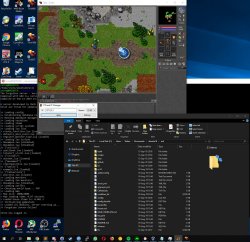Damon
Check my status to contact me :)
Having observed the years of change on Otland and OT in general, Linux has become more and more important as an efficient solution for OTS. What also seems to be the case though is that many people still seem to be "afraid" or hesitant to use Linux. I've been the same back then. I've only sticked to those often ridiculously expensive Windows VPS hosts instead of getting my a** app and dealing with Linux. I wish I had done so earlier. Not only is using Linux cheaper and more efficient (imho) but also do you aquire important soft skills which you can make use of not only in the OTS scene (similar to PHP and LUA which can also be used for other things than OT). I, myself, am not much into OTS development anymore but what I've taken away from learning/getting into Linux has paid back tenfold. I am by no means an expert. What I'd like to say about myself is that I've learned through trial and error and found out how to google efficiently. Of course, after some time you also remember some things but what I'm getting at is: Linux is not your enemy. Hence the title of the project.
Soo.. this thread is meant for you to ask any quick questions about how you can do X on Linux or any other Linux related questions. While I won't be able to help much with questions on the OTS side, I can help with general Linux things. Then, of course, this community has great people who know Linux and OTS like @HalfAway (cheaters anyway heh?!) that will probably also chime in here I can imagine. So see this thread as an opportunity to tackle Linux! Get involved! Mingle with it. Mess with it. Embrace it. When there are any questions, come back!
So now, ask away your questions
Getting a cheap vps to mingle with:
Check out some hourly billed CloudVPS services like Vultr, DigitalOcean and LunaNode. You pay like 0,05$/hour and can re-install/re-image/destroy/backup/cancel anytime. Often they also have free 10$-50$ credit for newcomers
Or spin up a Virtualbox on Localhost on your home PC
Soo.. this thread is meant for you to ask any quick questions about how you can do X on Linux or any other Linux related questions. While I won't be able to help much with questions on the OTS side, I can help with general Linux things. Then, of course, this community has great people who know Linux and OTS like @HalfAway (cheaters anyway heh?!) that will probably also chime in here I can imagine. So see this thread as an opportunity to tackle Linux! Get involved! Mingle with it. Mess with it. Embrace it. When there are any questions, come back!
So now, ask away your questions
Getting a cheap vps to mingle with:
Check out some hourly billed CloudVPS services like Vultr, DigitalOcean and LunaNode. You pay like 0,05$/hour and can re-install/re-image/destroy/backup/cancel anytime. Often they also have free 10$-50$ credit for newcomers
Or spin up a Virtualbox on Localhost on your home PC
Last edited:

